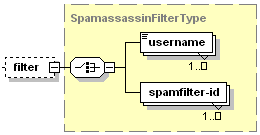Available Filters
Filtering is the way the request XML packet indicates the object to which an operation will be applied. The request XML packet filters objects using a special <filter> section. Parameters, nested in the filter node are called filtering rule. A filter contains as many different filtering rule types as the number of different parameters nested in the XML presentation of the filter node. A single operation can use only parameters of the same type in the filtering rule.
Note: Please, do not confuse this with Spam Filtering methods. Spam Filtering is made by the tool integrated into Plesk, and this kind of filtering is a specification of the operator.
SpamPatternFilter Filter
The SpamPatternFilter filter is used in add-pattern and del-pattern operations to add or remove patterns. For more information on the operations, refer to the Adding Pattern and Removing Pattern sections. Data type:SpamPatternFilter (spamfilter.xsd). The graphical representation of the filter node is as follows:

- The pattern node is optional. It specifies template of a e-mail address. For information on patterns, refer to the Defining Pattern section. Data type: string.
You can match multiple patterns using this filter as in the following example:
<filter>
<pattern>maillist@spamme.org</pattern>
<pattern>.org.ua</pattern>
</filter>
Note: Use the blank filter (<filter/>) to match all patterns.
SpamassassinFilter Filter
The SpamassassinFilter filter is used in get-patterns, get , set, get-allowed-preferences, get-allowed-lists operations. For more information on the operations, refer to the following sections:
- Retrieving Patterns
- Retrieving Info on Spam Filtering Service
- Setting Spam Filtering Preferences
- Retrieving Available Spam Filtering Preferences
- Retrieving Allowed Lists
Data type:SpamassassinFilter (spamfilter.xsd). The graphical representation of the filter node is as follows:

- The username node is required. It specifies a SpamAssassin user. You can specify e-mail address of a mailbox owner, or the 'admin' value. To access server settings of SpamAssassin, Plesk Administrator should set 'admin' as a value for this node. Data type: string.
- The spamfilter-id node is required. It specifies ID of a SpamAssassin user. Data type: integer.
You can filter by either username or spamfilter-id parameters as in the following example:
<filter>
<username>my@site.com</username>
<username>admin</username>
</filter>
A single operation does not support different types of parameters for a filtering rule, so the following filter will be considered invalid by Plesk:
<filter>
<username>my@site.com</username>
<spamfilter-id>admin</spamfilter-id>
</filter>
filter-id Node
![]()
If an operation uses filters in a request packet, the filter-id node is nested in a response packet. It returns the filtering rule parameter. If one of the following values was set as a filter rule, it is returned in the filter-id node of the response packet.
- Address of a mailbox owner, or string 'admin'
- ID of a SpamAssassin user
- Pattern
It is done to trace the request parameters in case of an error. Data type: anySimple.
All operations except for the check possess the filter-id node in the response packet.